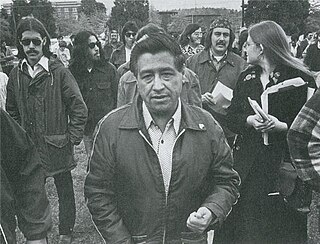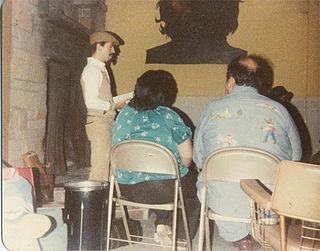
Chicano or Chicana is an ethnic identity for Mexican Americans who have a non-Anglo self-image, embracing their Mexican Native ancestry. Chicano was originally a classist and racist slur used toward low-income Mexicans that was reclaimed in the 1940s among youth who belonged to the Pachuco and Pachuca subculture. In the 1960s, Chicano was widely reclaimed in the building of a movement toward political empowerment, ethnic solidarity, and pride in being of indigenous descent. Chicano developed its own meaning separate from Mexican American identity. Youth in barrios rejected cultural assimilation into whiteness and embraced their own identity and worldview as a form of empowerment and resistance. The community forged an independent political and cultural movement, sometimes working alongside the Black power movement.

The Plan Espiritual de Aztlán was a pro-indigenist manifesto advocating Chicano nationalism and self-determination for Mexican Americans. It was adopted by the First National Chicano Liberation Youth Conference, a March 1969 convention hosted by Rodolfo Gonzales's Crusade for Justice in Denver, Colorado.

Rodolfo "Corky" Gonzales was a Mexican-American boxer, poet, political organizer, and activist. He was one of many leaders for the Crusade for Justice in Denver, Colorado. The Crusade for Justice was an urban rights and Chicano cultural urban movement during the 1960s focusing on social, political, and economic justice for Chicanos. Gonzales convened the first-ever Chicano Youth Liberation Conference in 1968, which was poorly attended due to timing and weather conditions. He tried again in March 1969, and established what is commonly known as the First Chicano Youth Liberation Conference. This conference was attended by many future Chicano activists and artists. It also birthed the Plan Espiritual de Aztlán, a pro-indigenist manifesto advocating revolutionary Chicano nationalism and self-determination for all Chicanos. Through the Crusade for Justice, Gonzales organized the Mexican American people of Denver to fight for their cultural, political, and economic rights, leaving his mark on history. He was honored with a Google Doodle in continued celebration of National Hispanic Heritage Month in the United States on 30 September 2021.

Chicanismo emerged as the cultural consciousness behind the Chicano Movement. The central aspect of Chicanismo is the identification of Chicanos with their Indigenous American roots to create an affinity with the notion that they are native to the land rather than immigrants. Chicanismo brought a new sense of nationalism for Chicanos that extended the notion of family to all Chicano people. Barrios, or working-class neighborhoods, became the cultural hubs for the people. It created a symbolic connection to the ancestral ties of Mesoamerica and the Nahuatl language through the situating of Aztlán, the ancestral home of the Aztecs, in the southwestern United States. Chicanismo also rejected Americanization and assimilation as a form of cultural destruction of the Chicano people, fostering notions of Brown Pride. Xicanisma has been referred to as an extension of Chicanismo.

The Chicano Movement, also referred to as El Movimiento, was a social and political movement in the United States that worked to embrace a Chicano/a identity and worldview that combated structural racism, encouraged cultural revitalization, and achieved community empowerment by rejecting assimilation. Chicanos also expressed solidarity and defined their culture through the development of Chicano art during El Movimiento, and stood firm in preserving their religion.

Luis Miguel Valdez is an American playwright, screenwriter, film director and actor. Regarded as the father of Chicano film and playwriting, Valdez is best known for his play Zoot Suit, his movie La Bamba, and his creation of El Teatro Campesino. A pioneer in the Chicano Movement, Valdez broadened the scope of theatre and arts of the Chicano community.

Alberto Baltazar Urista Heredia, better known by his nom de plume Alurista, is an American poet and activist. His work was influential in the Chicano Movement and is important to the field of Chicano poetry.

Chicano poetry is a subgenre of Chicano literature that stems from the cultural consciousness developed in the Chicano Movement. Chicano poetry has its roots in the reclamation of Chicana/o as an identity of empowerment rather than denigration. As a literary field, Chicano poetry emerged in the 1960s and formed its own independent literary current and voice.

Juan Felipe Herrera is an American poet, performer, writer, cartoonist, teacher, and activist. Herrera was the 21st United States Poet Laureate from 2015 to 2017. He is a major figure in the literary field of Chicano poetry.

Mexican American literature is literature written by Mexican Americans in the United States. Although its origins can be traced back to the sixteenth century, the bulk of Mexican American literature dates from post-1848 and the United States annexation of large parts of Mexico in the wake of the Mexican–American War. Today, as a part of American literature in general, this genre includes a vibrant and diverse set of narratives, prompting critics to describe it as providing "a new awareness of the historical and cultural independence of both northern and southern American hemispheres". Chicano literature is an aspect of Mexican American literature.

Lorna Dee Cervantes is an American poet and activist, who is considered one of the greatest figures in Chicano poetry. She has been described by Alurista as "probably the best Chicana poet active today."
I Am Joaquín is a 1969 short film by Luis Valdez, a project of his El Teatro Campesino.

Chicana literature is a form of literature that has emerged from the Chicana Feminist movement. It aims to redefine Chicana archetypes in an effort to provide positive models for Chicanas. Chicana writers redefine their relationships with what Gloria Anzaldúa has called "Las Tres Madres" of Mexican culture by depicting them as feminist sources of strength and compassion.
Political poetry brings together politics and poetry. According to "The Politics of Poetry" by David Orr, poetry and politics connect through expression and feeling, although both of them are matters of persuasion. Political poetry connects to people's feelings, and politics connects to current events. Poetry can also make political references and have real effects on the perception of politics.
Latino literature is literature written by people of Latin American ancestry, often but not always in English, most notably by Mexican Americans, Puerto Ricans, Cuban Americans, and Dominican Americans, many of whom were born in the United States. The origin of the term "Latino literature" dates back to the 1960s, during the Chicano Movement, which was a social and political movement by Mexican Americans seeking equal rights and representation. At the time, the term "Chicano literature" was used to describe the work of Mexican-American writers. As the movement expanded, the term "Latino" came into use to encompass writers of various Latin American backgrounds, including Mexican, Puerto Rican, Cuban, and others.
This is a Mexican American bibliography. This list consists of books, and journal articles, about Mexican Americans, Chicanos, and their history and culture. The list includes works of literature whose subject matter is significantly about Mexican Americans and the Chicano/a experience. This list does not include works by Mexican American writers which do not address the topic, such as science texts by Mexican American writers.

Xicanx is an English-language gender-neutral neologism and identity referring to people of Mexican descent in the United States. The ⟨-x⟩ suffix replaces the ⟨-o/-a⟩ ending of Chicano and Chicana that are typical of grammatical gender in Spanish. The term references a connection to Indigeneity, decolonial consciousness, inclusion of genders outside the Western gender binary imposed through colonialism, and transnationality. In contrast, most Latinos tend to define themselves in nationalist terms, such as by a Latin American country of origin.

Chicano cinema is an aspect of Mexican American cinema that refers to the filmmaking practices that emerged out of the cultural consciousness developed through the Chicano Movement. Luis Valdez is generally regarded as the first Chicano filmmaker and El Teatro Campesino as the first theater company.
Nicki Gonzales is an educator and historian. She is an associate professor of history at Regis University, and was the Colorado State Historian in 2021-2022. She was the first Latino person in this role.











